Equine Services Offered
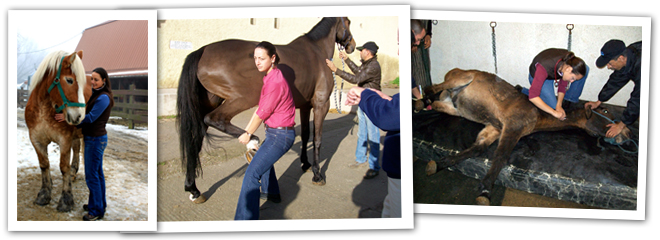
-
Acupuncture
-
Chinese herbal therapy
-
Colic and internal medicine case work-ups
-
Consulting services
-
Emergency care (limited)
-
Field surgery and laceration repair
-
Laboratory services
-
Sports Medicine
- Pre-purchase exams
- Lameness evaluations including flexions and gait analysis
- Digital radiography (stall-side digital x-rays)
- Digital ultrasonography
- Neurologic exams
- Diagnostic nerve blocking
- Therapeutic joint injections
- Mesotherapy
- Back injections
-
Wellness care
- Vaccinations
- Digital Coggins
- Health Certificates
- Deworming (with fecal egg counts)
- Nutrition counseling
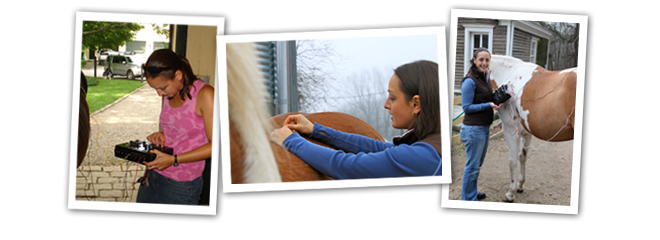
Equine Acupuncture FAQs
- Arthritis
- Laminitis
- Tendon and ligament damage
- Sore backs
- Stomach ulcers
- Cushings Disease and Equine Metabolic Syndrome
- Heaves and other breathing problems
- Navicular syndrome
- Uveitis
- Fertility problems
- Chronic diarrhea
- Behavioral issues
- Neurologic conditions
- WTEE (we’ve tried everything else)
It is important to remember that acupuncture is a cumulative process and that one session builds on the previous session. When a horse is treated for an orthopedic condition—including arthritis, back pain, tendon/ligament problems or navicular syndrome—improvement is generally seen or felt after 3 treatments spaced about 1 week apart. That said, most riders notice an immediate positive response in their horse’s comfort under saddle. Internal medicine conditions being treated with acupuncture may require more treatments (7-9) before a response to therapy is noted.
Fecal Egg Counts and Targeted Deworming
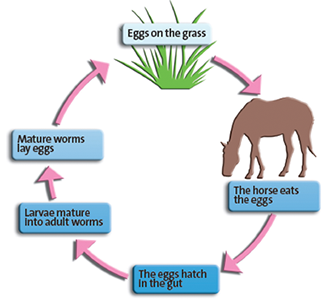
In years past, most of us were taught that deworming a horse using a series of rotating dewormers every 8 weeks was the best way to combat a horse’s intestinal parasites. For years, automatically deworming a horse six times per year, regardless of the horse’s parasite load, was the industry standard. However, over time, this rotational deworming has led to a serious problem whereby intestinal parasites have become resistant to the dewormers intended to kill them.
The consequences of over-deworming are serious. To date, there are only 3 main classes of dewormers and there are currently no new types of dewormers under development. This potential crisis has necessitated the development of a new deworming strategy—targeted deworming through fecal egg counts—that is now the industry standard. A fecal egg count (FEC) is a simple, non-invasive and inexpensive lab test that identifies the number of parasite eggs that a horse is “shedding” in its feces. As only 20% of horses are contributing 80% of parasite eggs in the environment, identifying these “high shedders” is key to managing parasite control.
Most horses will be classified as “low shedders” meaning they shed no parasite eggs or a very small number of parasite eggs per gram of manure. These low shedders will only need to dewormed twice a year. Biannual fecal egg counts (easily tied-in with spring and fall vaccines) will confirm that the dewormers are doing their job and that the horse’s intestinal worms have not developed resistance. Those horses falling into the moderate shedder category will need an extra deworming and fecal egg count in the summertime. Those few horses deemed “high shedders,” are the ones who will require the most frequent deworming to ensure that parasite load does not become too high.
It is the goal of Dr. Harrison and Visiting Veterinary Services to segue all horses from an automatic rotational deworming program to a targeted one using Fecal Egg Counts. As there can be numerous factors that influence a horse’s parasite burden, the frequency of fecal egg counts (and deworming) will be tailored to your horse’s individual needs. Broodmares, foals, and horses with unknown deworming histories will be given different recommendations. The cost of the Fecal Egg Counts is recovered when you consider that most horses will be dewormed much less frequently and much more effectively.
Targeted Deworming in a Nutshell
Low Shedders |
Moderate Shedders |
High Shedders |
|
|---|---|---|---|
| January | No deworming | No deworming | oxibendazole |
| March | Fecal Egg Count followed by ivermectin or moxidectin deworming | Fecal Egg Count followed by ivermectin or moxidectin deworming | Fecal Egg Count followed by ivermectin or moxidectin deworming |
| July | No deworming | pyrantel pamoate deworming followed by FEC 2 weeks later | pyrantel pamoate deworming followed by FEC 2 weeks later. |
| September | ivermectin or moxidectin plus praziquantel followed by FEC 2 weeks later | ivermectin or moxidectin plus praziquantel followed by FEC 2 weeks later | ivermectin or moxidectin plus praziquantel followed by FEC 2 weeks later |
Have any questions?
Feel free to call or email Dr. Harrison.
Cell: (914) 420-5420
Email: oboevet@gmail.com
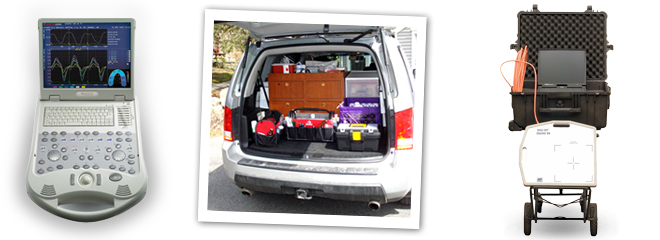
Pre-purchase exams
Buying a new horse? Dr. Harrison strongly recommends a pre-purchase exam before you buy your new horse. A pre-purchase exam is the most thorough and comprehensive exam offered and generally takes several hours. During this exam, your potential new horse is examined head to tail for any pre-existing illnesses or lameness. After a standing exam, your horse will be evaluated at the walk, trot, and canter to check for soundness. "Flexion tests" on all four limbs are performed to look for joint pain and neurologic tests are performed as well. Depending on what is going to be asked of your horse, many riders elect to have pre-purchase x-rays taken of the horse as well. These screening films can help identify early arthritis, past injuries and help give a prognosis for future performance. Blood tests—looking for Lyme disease and Cushings disease, for example—may also be run at this time to ensure that the buyer has all the information at her fingertips as she decides whether or not to purchase the horse. A full written report is provided after the exam is completed.
Mesotherapy
Mesotherapy is a human treatment that originated in France about 30 years ago and has since made its way to the veterinary world in the United States where it is becoming increasingly popular. Back pain is a common complaint in the equine athlete. It is easy for back muscles to become sore from a primary problem (such as kissing spines) or from a secondary problem such as hind-end arthritis or poor saddle fit. Mesotherapy involves lines of multiple tiny superficial injections along the back (or neck) into the mesoderm—the middle layer of the skin. The cocktail of medications injected during mesotherapy (which may include steroids, lidocaine and several homeopathic medications) helps to block pain pathways and facilitate muscle relaxation. Mesotherapy can be an excellent stand-alone therapy but can also prove to be very beneficial in conjunction with acupuncture.
Vaccine Recommendations for Adult Horses
Core vaccines: These are vaccines that all horses living in the northeast should have regardless of age, use or exposure to other horses.
| Disease | Frequency of vaccination | Comment |
|---|---|---|
| Tetanus | Annually in the spring. Booster given only if horse receives penetrating injury. | Booster given only if horse receives penetrating injury. Vaccine prevents the usually fatal anaerobic bacterial infection that causes rigid paralysis. |
| Rabies | Annually in the spring. | Vaccine prevents the fatal neurologic disease. |
| Eastern & Western Equine Encephalitis (EEE/WEE) |
Annually in the spring. Booster given if horse travels to areas where mosquitoes are prevalent year-round. | Vaccine prevents the often-fatal neurologic disease that is transmitted by mosquitoes. |
| West Nile Virus (WNV) | Bi-annually in the spring and fall. | Vaccine prevents potentially life-threatening neurologic disease. |
Risk-based vaccines: These vaccines are recommended based on the likelihood that your horse will be exposed to a given disease. Recommendations are based on your horse’s use, where he is boarded and to what population of horses he is exposed. Dr. Harrison will tailor a vaccine protocol to your horse’s individual needs.
| Disease | Frequency of vaccination | Comment |
|---|---|---|
| Equine Herpesvirus (Rhino) |
Bi-annually in the spring and fall. | Vaccine limits the severity of the respiratory and abortion-inducing form of the disease (not the neurologic form). Any horse exposed to other horses should be vaccinated.. |
| Equine Influenza (Flu) |
Bi-annually in the spring and fall. | Vaccine prevents the extremely contagious virus that causes high fever, depression & respiratory signs. Any horse exposed to other horses should be vaccinated. |
| Potomac Horse Fever (PHF) |
Bi-annually in the spring and early fall | Vaccine reduces likelihood of potentially life-threatening complications (laminitis & diarrhea). Spread by insects known to carry the organism in our geographic area. |
| Strangles | Bi-annually in the spring and fall. | Vaccine limits the severity of clinical signs (fever, abscessed lymph nodes) for this highly contagious disease. Horses exposed to those leaving the property should be vaccinated. |
A Coggins test is a federally-regulated blood test to insure that your horse does not have Equine Infectious Anemia, a contagious and fatal blood disease of horses spread by mosquitoes. A Coggins test is generally run once annually although certain interstate and international travel may require more frequent testing. Visiting Veterinary Services uses GlobalVetLink, a computerized system that allows you access to your Coggins test whenever you need a copy. Three photographs of your horse will be taken when blood is pulled and then GlobalVetLink will automatically age him or her every year going forward. The following information is needed in order for a Coggins test to be run:
- Show name (if applicable)
- Barn name
- Age
- Breed
- Color
- Gender (mare, gelding, stallion)
- Physical address where the horse is boarded
- Address of the owner
Chinese Herbs

Chinese herbal medicine is an important adjunct therapy to almost all acupuncture. Combinations of powerful natural ingredients can both enhance the effects of the acupuncture and maximize the 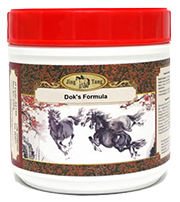 amount of time that your animal can go between acupuncture treatments. The Chinese herbal formulas used by Dr. Harrison all come from Jing Tang Herbal, a state-of-the-art and closely regulated facility that produces high-quality veterinary herbal medicine. Through Jing Tang Herbal, Dr. Harrison has access to hundreds of herbal medicines. The herbal formula she selects for your animal depends on the animal’s Bian Zheng—the results of his/her Chinese physical exam.
amount of time that your animal can go between acupuncture treatments. The Chinese herbal formulas used by Dr. Harrison all come from Jing Tang Herbal, a state-of-the-art and closely regulated facility that produces high-quality veterinary herbal medicine. Through Jing Tang Herbal, Dr. Harrison has access to hundreds of herbal medicines. The herbal formula she selects for your animal depends on the animal’s Bian Zheng—the results of his/her Chinese physical exam.
Most herbal formulas are used for anywhere between 1 and 6 months. For an acute problem or 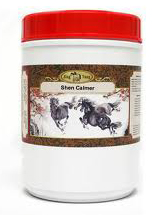 injury, your animal may only need a short course of herbal medicine. For more chronic problems, herbal therapy may be extended. The Chinese herbs come in powder form and many of the more commonly-used herbal medications also come in concentrated forms to ease administration. While goats, camelids and other ruminants can be safely given herbal medication, their unique form of digestion requires a MUCH higher dosage of the herb—this is often cost-prohibitive or impractical.
injury, your animal may only need a short course of herbal medicine. For more chronic problems, herbal therapy may be extended. The Chinese herbs come in powder form and many of the more commonly-used herbal medications also come in concentrated forms to ease administration. While goats, camelids and other ruminants can be safely given herbal medication, their unique form of digestion requires a MUCH higher dosage of the herb—this is often cost-prohibitive or impractical.
Some examples of commonly prescribed herbs:
- Body Sore (good for treating soft tissue injuries, back pain and musculoskeletal problems)
- Shen Calmer (good for calming anxious animals)
- Stasis Breaker (good for slowing tumor growth in stable animals)
- Hindquarter Weakness (good for stabilizing and promoting hind-end strength)
- Tendon and Ligament Formula (good for promoting healing of tendon/ligament injuries )
- External Wind (good for quieting down itchy skin)
- Hot Hoof II (good for treating laminitis in horses)
- Dok’s Formula (good for treating arthritis, chronic joint pain, hip dysplasia and degenerative joint disease)







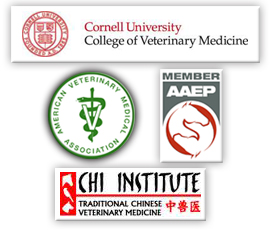 Email:
Email: